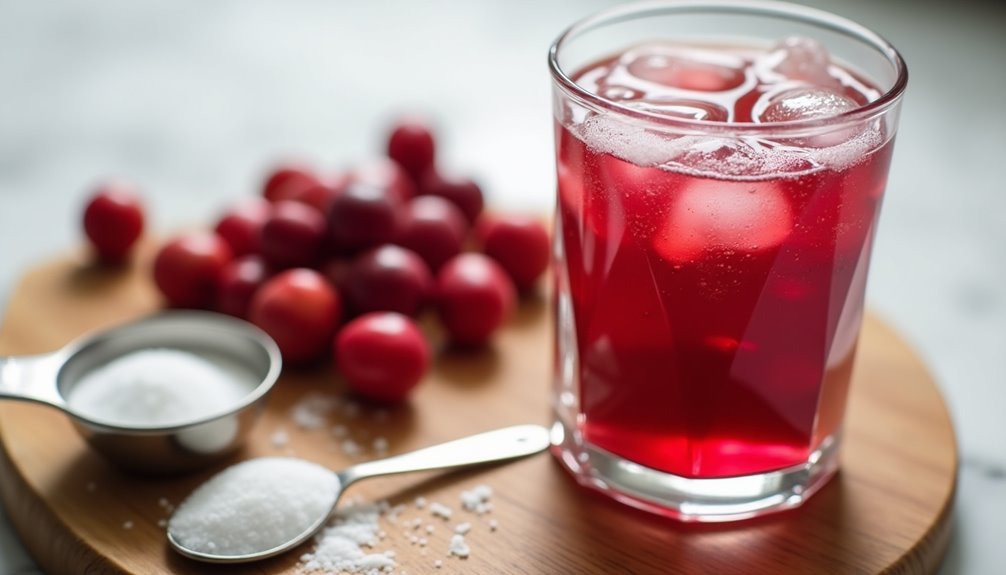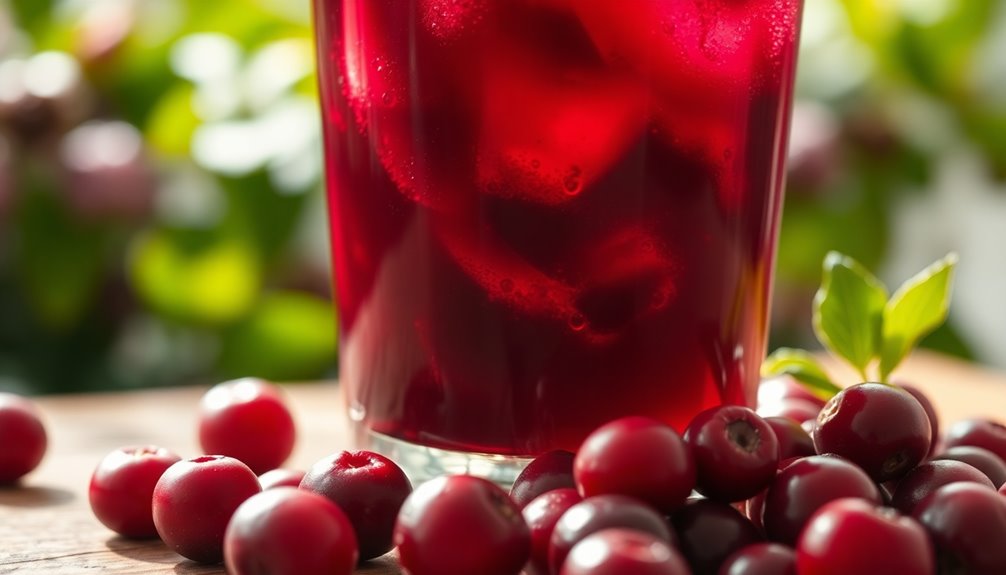Cranberry juice packs quite a carbohydrate punch, with about 31 grams of total carbs per cup. Most of those carbs—around 30 grams—come from sugars. If you’re keeping an eye on your carb intake, you’ll want to be mindful of this sugary drink. While it does offer some vitamin C benefits, balancing your enjoyment is key. Want to know more about how to enjoy cranberry juice while managing its sugar content? One approach is to dilute cranberry juice with water or club soda, which can help reduce the overall carb content in cranberry juice while still allowing you to enjoy its distinctive flavor. Additionally, opting for unsweetened cranberry juice can provide the benefits without the added sugars. By being mindful of the carb content in cranberry juice, you can incorporate it into a balanced diet without overindulging.
Key Takeaways
- One cup of unsweetened cranberry juice contains approximately 31 grams of total carbohydrates.
- About 30 grams of the carbohydrates in cranberry juice come from sugars.
- Cranberry juice contributes around 95% of its calories from carbohydrates.
- It has minimal fiber content, around 0.3 grams per cup.
- Individuals managing blood sugar levels should be cautious due to its high sugar content.

Have you ever wondered just how many carbs are in cranberry juice? If you're considering adding this tart beverage to your diet, it's essential to know what you're getting in terms of carbohydrates. One cup of cranberry juice, specifically the unsweetened variety, contains approximately 31 grams of total carbohydrates. That's quite a significant amount, especially when you factor in the daily carbohydrate recommendations.
When you break it down, about 30 grams of those carbs come from sugars. This means that cranberry juice is primarily a sugary drink, which can be surprising if you thought it was a healthy alternative. Since it contributes around 95% of its calories from carbohydrates, it's clear that this beverage is high in carbs. If you're watching your sugar intake or managing your carbohydrate consumption, you'll want to be mindful of how much cranberry juice you're drinking.
Interestingly, the fiber content in cranberry juice is minimal, usually around 0.3 grams per cup. This lack of dietary fiber means that the sugars in the juice can spike your blood sugar levels more rapidly compared to other beverages that contain fiber. For those who are keeping an eye on their blood sugar levels or managing conditions like diabetes, this is a crucial point to consider.
Aside from carbohydrates, cranberry juice does offer some nutritional benefits. It's known for its high levels of ascorbic acid, or vitamin C, which can help support your immune system. A cup of cranberry juice can provide a good portion of your Daily Value for vitamin C, making it a refreshing option when you're looking for a boost in this vitamin.
However, you should balance that vitamin C intake with the high sugar content you're also consuming. If you're considering cranberry juice as part of your diet, it's essential to enjoy it in moderation. While it can be a delicious treat, the high sugar content means you shouldn't indulge too often.
Instead of drinking it straight, you might consider diluting it with water or mixing it into smoothies, where you can add some fiber-rich fruits and veggies to balance out the sugar content.
Frequently Asked Questions
How Many Carbs Are in an 8 Oz Glass of Cranberry Juice?
When you pour yourself an 8 oz glass of cranberry juice, you're getting about 31 grams of carbohydrates.
Most of those carbs come from sugars, which can be around 30 grams in that serving.
Since cranberry juice is low in dietary fiber, it contributes very little to your daily fiber intake.
If you're watching your carbohydrate intake, it's crucial to keep an eye on how much cranberry juice you consume.
Is Cranberry Juice Good for a Low Carb Diet?
Cranberry juice isn't ideal for a low-carb diet due to its high sugar content.
If you're watching your carbohydrate intake, you might find it challenging to include regular cranberry juice in your meals.
However, you can consider unsweetened options or dilute it with water to lessen the carbs.
Always check the labels, so you can make informed choices that align with your dietary goals while still enjoying the health benefits.
How Many Carbs Are in Ocean Spray Cranberry Juice?
Crisp, colorful cranberries create a curious question: how many carbs are in Ocean Spray Cranberry Juice?
In a 1 cup serving, you'll find about 31 grams of total carbohydrates, with nearly all of that being sugar—around 30.61 grams.
This high sugar content means if you're watching your carb intake, you might want to limit your servings.
How Many Carbs Are in 1/2 Cup of Cranberry Juice?
When you check the carbohydrate content in a 1/2 cup of cranberry juice, you'll find it contains about 15.5 grams.
Most of those carbs come from sugars, with roughly 15.3 grams classified as total sugars. If you're watching your sugar intake, it's wise to keep this in mind.
Besides carbs, cranberry juice also offers vitamin C, which is great for your immune health, making it a beneficial addition to your diet.
Conclusion
In conclusion, while cranberry juice might seem like a guilt-free elixir, it actually packs a surprising carb punch that could rival a mountain of candy! Just a cup can contain around 30 grams of carbs, turning your health drink into a sweet sugar rush that could send your diet spiraling into chaos. So, next time you're sipping that vibrant red goodness, remember: moderation is key, or you might find yourself on a carb rollercoaster you never intended to ride!
Cindy thoroughly researches juicing trends, techniques, and recipes to provide readers with practical advice and inspiration. Her writing style is accessible, engaging, and designed to make complex concepts easy to understand. Cindy’s dedication to promoting the advantages of juicing shines through her work, empowering readers to make positive changes in their lives through the simple act of juicing.
















